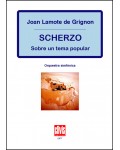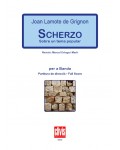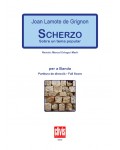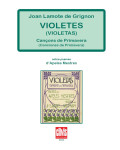
No products
Prices are tax included
Product successfully added to your shopping cart
There are 0 items in your cart. There is 1 item in your cart.
- English
- Castellano
- Català
Joan Lamote de Grignon i Bocquet was born in Barcelona on 7 July 1872. He studied in the Liceu Conservatory, which was Barcelona’s only conservatory at that time. Antoni Nicolau taught him composition and was one of the people who had the greatest influence on his musical career.
In 1890 he was appointed piano teacher in the Liceu Conservatory, which was when he began composing for piano. Although Lamote’s musical work extended over a very long period of his life, his ideological and musical education was consolidated during the time when Modernism was at its peak, influencing him profoundly.
In 1899 his only son, Ricard, was born. His name was chosen given the musician’s great admiration of Richard Wagner. In this period he composed Gavota en re major (Gavotte in D major), Sis cançons catalanes (Six Catalan Songs), Imogina and L’Angelo, some of which premiered in the Teatre Líric.
The turn of the century revealed a more mature Joan Lamote who started to compose more ambitious pieces. From this time, we can find the symphonic poem Médora (premiered at the Liceu on 22 March, 1900), the oratorio La Nit de Nadal (Christmas Night, 1902) and the lyrical poem Hespèria (premiered at the Liceu on January 25, 1907).
In 1910 he acceded to the position of Conductor of the Municipal Band of Barcelona (by public competition) although ultimately he did not take the post due to political pressure. In the same year however, Lamote founded the Symphonic Orchestra of Barcelona under the sponsorship of the Musical Association of Barcelona, which he managed until 1925. This orchestra went on to earn great prestige in the musical scene of both Barcelona and Catalonia. In 1914 he resumed his place in the Municipal Band of Barcelona where he remained until 1939, carrying out a great artistic and educational task, bringing the working class closer to symphonic music.
He adapted the most important pieces of the symphonic and lyrical repertoire for wind ensembles; of particular note are the Prelude to Lohengrin by R. Wagner and the New World Symphony by Dvorak. Furthermore, his catalogue of over 60 original pieces covered a huge variety of groups and ensembles, and developed several genres, from the Lied to symphonic music and passing through the zarzuela and opera.
-
Scherzo sobre un tema popular
Edition: DigitalThe general structure of the Scherzo is very balanced, breaking with the stratification of the classical scherzo yet maintaining the playful spirit and confident nature that created it.
21,18 € -
Scherzo sobre un Tema Popular
Edition: PrintedThe Scherzo sobre un tema popular (1897) is the first important orchestral work of the composer. It was reviewed and re-orchestrated by himself in 1910 and transcribed for band a few years later. This is the actualized adaptation for band.
43,00 € -
Scherzo sobre un Tema Popular
Edition: DigitalThe Scherzo sobre un tema popular (1897) is the first important orchestral work of the composer. It was reviewed and re-orchestrated by himself in 1910 and transcribed for band a few years later. This is the actualized adaptation for band.
30,10 € -
Violetes, Cançons de Primavera
Edition: PrintedThese 12 songs based on the texts of the poet Apeles Mestres constitute the most emblematic body of work by Joan Lamote de Grignon, composed a century ago. We now present a new edition, carefully revised by the soprano and music researcher Olga Guerrero Miracle.
31,00 € -
Violetes, Cançons de Primavera
Edition: DigitalThese 12 songs based on the texts of the poet Apeles Mestres constitute the most emblematic body of work by Joan Lamote de Grignon, composed a century ago. We now present a new edition, carefully revised by the soprano and music researcher Olga Guerrero Miracle.
26,20 €







